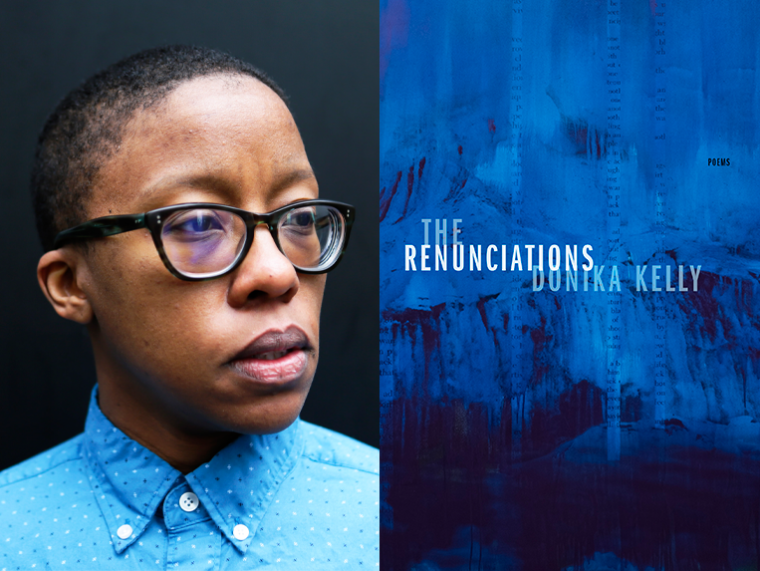This week’s installment of Ten Questions features Donika Kelly, whose second poetry collection, The Renunciations, is out today from Graywolf Press. Throughout The Renunciations, Kelly often invokes the monumental—deities, the oceans, continental drift theory—but she always returns to the individual. In one poem, she writes, “I am neither land nor timber, nor are you / ocean or celestial body. Rather, / we are the small animals we’ve always been.” Yet it is through bold metaphor—her understanding of memories and the body as landscapes—that Kelly finds insight. She retraces experiences of abuse as a child and divorce as an adult, but also travels beyond these wounds and builds into a new world, rich in possibility, with each poem. “I can’t imagine a time before having The Renunciations as a part of my emotional ecosystem and poetic landscape,” writes francine j. harris. Donika Kelly is also the author of Bestiary (Graywolf Press, 2016), which won the Kate Tufts Discovery Award and the Hurston/Wright Legacy Award for Poetry. Her poems have appeared in the New Yorker, Foglifter, and the Paris Review. The recipient of fellowships from Cave Canem, the Fine Arts Work Center, and the Lannan Foundation, she lives in Iowa City and teaches at the University of Iowa.

Donika Kelly, author of The Renunciations. (Credit: Ladan Osman)
1. How long did it take you to write The Renunciations?
I wrote the poems in The Renunciations over the course of about five years or so. The oldest poems are from 2013 and the most recent were written in 2018. I started to gather these poems into what would become the book in 2017, when I realized that the poems were in conversation with each other and were a part of a larger project.
2. What was the most challenging thing about writing the book?
The biggest challenge to writing the book was living through the events I write about and finding some peace on the other side. Each poem in this collection was a step toward that peace: the other side of divorce, the other side of having survived childhood sexual abuse. Once the poems were written, then came the fun part of figuring out how they fit together.
3. Where, when, and how often do you write?
I write when I feel that I have something to say, which in real life means I write about two to three times a year in one- to two-week stretches. I set a pretty low bar for myself by committing to write twenty minutes a day, and I usually begin with a series of questions meant to lead me closer to myself. I write best at night, between 10 PM and 1 AM, which isn’t feasible for me during the semester.
4. What are you reading right now?
I’ve had a really tremendous year of reading. Poetry collections I have enjoyed recently are Taylor Johnson’s Inheritance and Dujie Tahat’s Salat. Both collections are a query into what we carry in our bodies, as prayers, as love, and what we mean to hold onto.
5. Which author, in your opinion, deserves wider recognition?
I’m going to answer this a little askance and make a small claim for reading entire poetry collections, as the poet orders the book. The book that convinced me of this practice, that brought me not only into the world of a poem but the whole of book, was Natasha Trethewey’s Bellocq’s Ophelia. The way the two primary sections resonate against and with each other to build the portrait of the speaker is expert and stunning.
6. What is the biggest impediment to your writing life?
Life stress and anxiety get in the way of my writing. I need a quiet mind to write, and the travails of being alive can get quite loud.
7. What is one thing that your agent or editor told you during the process of publishing this book that stuck with you?
My editor, Jeff Shotts, is a patient man. We had many conversations about how to create more white space between sections. Initially I resisted even the thought of sections, but over the course of a year I came around to the kindness and generosity of giving the reader space to process all the book holds.
8. How did you know when the book was finished?
Late in the process, one of the “Now” sections was giving me background trouble—nothing was wrong with it, but it also wasn’t correct. My dear friend Ama Codjoe suggested reordering the poems in the section. Again I was resistant, but I came around more quickly, and then the manuscript felt complete.
9. Who is your most trusted reader of your work and why?
I have a trusted network of readers, Ama Codjoe, Ladan Osman, and my beloved, Melissa Febos, because I need the volume of more than one trusted reader to hear suggestions over my own investment in being right. They are such incisive, compassionate, close readers, and I trust their sense of my work.
10. What’s the best piece of writing advice you’ve ever heard?
In Mary Oliver’s A Poetry Handbook, she writes about the importance of imitation, which I understand to be a skill-building exercise, a way to apprehend a technique. It’s been a vital practice for me because I haven’t always had, intuitively, the techniques I’ve needed to write a given poem.







